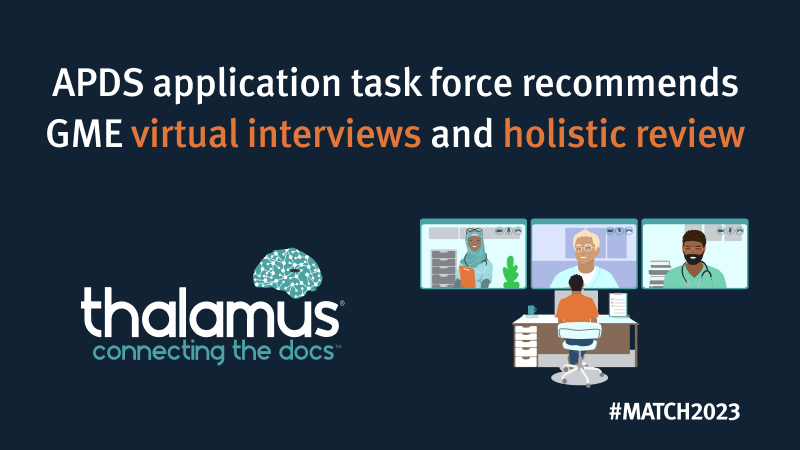Join Team Thalamus and save weeks of effort managing your next GME recruiting season
The APDS Application Task Force has issued recommendations for the upcoming recruiting cycle and APDS Surgery provided a summary to help you plan. Take a quick read and learn how Thalamus can help make your #Match2023 season the best one yet!
- The number of submitted application numbers by applicants should be guided by available data and consider a candidate’s unique characteristics. The number of accepted interviews by applicants should be guided by available data based upon applicant characteristics.
Team Thalamus cares about data and is helping to measure it nationally. Read our article on Reducing Over-Interviewing in the Anesthesiology Residency Match published in Cureus here. Our Cortex and Cerebellum products combine the best of AI, data, and analytics to help you meet your institutional recruitment goals. - Holistic Review is strongly recommended as part of the General Surgery residency selection process.
Did you know that Cortex is our technology-assisted holistic review and application screening tool? Learn more about it here! - Transparency regarding firm eligibility criteria for each program is strongly recommended.
Thalamus supports and has signed the GME Bill of Rights. - USMLE Step 1 & COMLEX Level 1 scores should again be de-emphasized in the 2022-2023 Application Cycle. Applicants & their standardized scores should be considered within the context of holistic review, and programs should disclose how Step 2 and Level 2 will be considered.
Applicants are more than board scores. Cortex helps you score applicants, blind information to eliminate bias, and use algorithms to identify optimal applicants. - General Surgery residency programs should strongly consider taking part in the AAMC ERAS Application Pilot Study (Supplemental Application).
For the upcoming #Match2023 recruitment season, Thalamus is rolling out new features to support the integration of ERAS supplemental application data, including preference signaling. - Programs should offer the first round of interviews between Wednesday, October 26 and Tuesday, November 1, 2022 and allow a minimum of 48 hours for the candidates to respond before extending an offer to a different candidate.
Thalamus gives you full control over invites and scheduling including private events, lock out dates, tracks, tiering and more. We work with the largest specialities including OB/GYN, Orthopaedic Surgery, and General Surgery to assist in managing standardized and universal interview offer days. Read our Retrospective Analysis on Orthopaedic Surgery Universal Interview Offer Day (UIOD) here. - APDS Surgery strongly recommends programs a) offer only the number of interviews available and b) disclose expectations about interview response and cancellation.
Thalamus keeps track of all invitation statistics in real time and Cerebellum provides all outcomes metrics including geography and DEI. - APDS Surgery recommends virtual interviews with the option of a voluntary, post-evaluative (e.g., after program rank list finalization, aka decoupled rank list) live site visit.
Thalamus video provides a comprehensive integrated virtual interview experience including a master view to easily manager your interview day. New this upcoming recruitment season, Thalamus will also support multiple follow up interviews and social events. - APDS Surgery recommends that interview methods adhere to the following best practices:
- Ensure equitable opportunities to all invited applicants
- Create uniformity of the evaluation process within the program
- Provide transparency about the process
- Implement mitigation strategies to prevent bias
